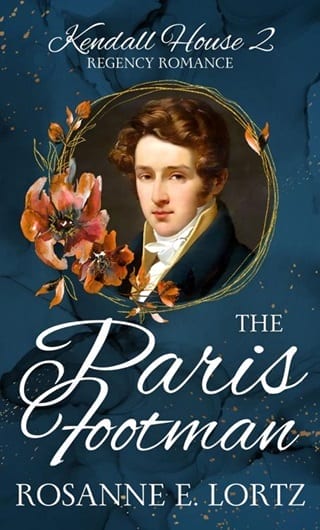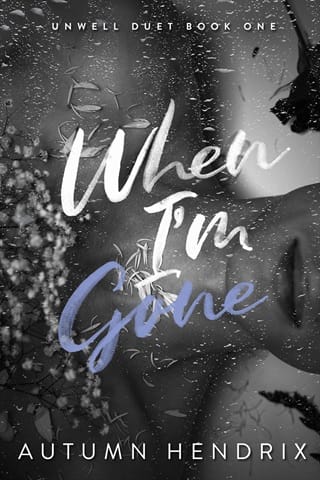33. Journey
Chapter thirty-three
Journey
" Allons, mes beautés! " said Jacques, leading out a pair of horses to attach to the traces of the carriage. "Come on, my beauties."
Gyles translated the words in his head without the need to think twice. His French lessons with Cosette had begun to bear fruit, and since the housekeeper, Madame Laurent, knew only French, he had become proficient at understanding his chores in that language.
The shooting lessons with Jacques, however, had been less of a triumph. No matter how much ball and powder they wasted, the practice seemed to have no effect. Gyles could dig a trench, or carry water, or polish silver with the best of them, but his shot always went wide whenever he pulled the trigger on a pistol.
After a dozen sessions of target practice on the outskirts of the town, the coachman had given up on him. " Sacrebleu! You'd best pray you have me with you if you meet a highwayman again," Jacques said gruffly. Then his enormous face split into an onion-scented grin, "Or Lady Louisa. She'll keep you safe."
It was the kind of friendly gibe that might make a man bristle, but Gyles found that he did not much mind. He liked the fact that Louisa could shoot a pistol—it was one less thing he had to worry about for her as she braved the world alone.
The road to Malmaison was not a long one, and it was unlikely that they would meet any highwaymen en route . Rumour had it that Napoleon still travelled the road often; he was unable to discard his affection for his first wife even as he busied himself trying to sire an heir on his second one. But Gyles had heard the count assure Louisa that Napoleon had not been invited to this house party.
As Jacques fastened the horses at the front of the carriage, Gyles hefted three trunks in swift succession onto the bench on the back. He took some rope from the carriage box and lashed them securely. From one trunk to three—from vanished heiress to enchantress of Paris—Lady Louisa had begun to grow into her new role.
Her wardrobe had expanded significantly leading up to the trip to Malmaison. Boxes had arrived from the modiste with a half dozen new slippers, shawls, morning gowns, evening gowns, and an elaborately embroidered ballgown in red and orange.
The black-moustached agent, Monsieur Dupont, had surfaced again, this time bearing three of Louisa's most sparkling sets of jewellery. After a consultation in the drawing room, he departed. Louisa had kept a parure of sapphires and returned the other pieces to Monsieur Dupont. Gyles heard the word vendre fluttering in the air, and from his French lessons with Cosette, he knew the word meant to sell .
How many of her jewels would Louisa need to sell? It was certainly difficult to finance the life of an aristocrat in Napoleon's Paris. Gyles wondered how long it would be before Louisa ran out of jewels to pawn. Presumably, she was hoping they would last until she came into her own inheritance a few months from now. That seemed to be her supreme goal: inheritance and independence. He had never needed to seek those things himself—they had been handed to him on the day his father died—but he admired her single-minded striving to take her life into her own hands and make something of it.
Whether that something would make her happy was another question altogether….
The reappearance of Monsieur Dupont reawakened the memory of the black-moustached man's meeting with the Comte Dammartin a month or more ago. Gyles did not know why it bothered him so much. Surely, a bank had many customers. Surely, it was only reasonable that an agent from the bank would meet with more clients than one. Surely, Dupont's conversation with the comte had nothing to do with Louisa. And yet, Gyles could not help feeling that Alphonse Aubert was a little too intentional with his attentions. Did he have some design on his cousin that involved the black-moustached bank agent?
It was a dozen miles from Paris to Malmaison. The count planned for Louisa's carriage, driven by Jacques Martin, to follow his own carriage at a close distance. But when Louisa heard the seating arrangements that put her alone with the count in the first carriage—and Gyles alone with Cosette in the second carriage—her heart-shaped face crinkled into a frown. " Eh bien , I shall need my maid beside me for the journey."
"Surely not," urged her cousin, a look of disappointment coming over his face.
" Mais oui! What if a curl were to come unpinned? I cannot exit the carriage at Malmaison with my hair looking like a stork's nest. I must have her with me to adjust my coiffure."
" Certainement, milady ," said Cosette, pertly inserting herself between Louisa and her cousin like a shell-knife between two halves of an oyster. Gyles grinned. The French maid was irrepressible and knew just how to tease her betters without landing herself in hot water.
"Oh, very well," said the count, blowing upwards to keep his black corkscrew curls from dangling in his eyes. It was an affectation that Gyles despised. He wished he had a pair of shears so that he could trim the count's overgrown forehead fringe like a garden hedge.
Gyles took Cosette's small trunk and added it to the luggage already secured. Jacques nodded at him as he walked past the horses. "You've lost both your ladies now," the coachman said gruffly, eyeing Cosette as she stood by Dammartin's carriage.
"Yes, but I'm not sure that either of them is truly mine."
"Hmm…" said the coachman, pulling out a pipe and filling it with tobacco. He looked at the pretty, petite lady's maid thoughtfully, his large face ruminating over something inscrutable.
" Bon voyage, Monsieur Pebble," called out Cosette, giving a saucy wink as she climbed into the count's conveyance. Gyles could not tell if the wink was for him or for Jacques.
" Bon voyage, Mademoiselle Bouchard," he replied. Removing his own satchel from his shoulder, he tossed it onto the seat in the carriage. He was about to climb in after it, but he paused to watch the count hand Louisa into the other coach .
Louisa dipped her head, adorned with a green and blue Toque Parée. The stylish cap framed her face to perfection with its edge of golden braid and plume of ostrich feathers.
" Bon voyage ," he said in the faintest whisper, doing little more than mouth the words. Her nostrils flared delicately. She turned her head away, and as her cousin stepped into the carriage after her, she disappeared from Gyles' sight.
The carriage ride to Malmaison took a little over two hours. Louisa could see that Alphonse was equally happy to flirt with either her or Cosette but that he was attempting to restrain himself from ogling the maid when he thought his cousin might be glancing in his direction.
Louisa rolled her eyes and looked out at the wintry countryside. What was it about men? Her father. Her uncle. Her cousin. They were all eyes and hands and other more unmentionable parts, but the one organ that seemed lamentably lacking in all of them was the heart. They were experts at flirtation but hopeless as King George's sons at any semblance of fidelity.
And then there was Gyles Audeley, steady as a draft horse, constant as a guide star, chivalrous as a knight tilting at windmills.
But also as unlikely as a parish priest to drop a flirtatious wink in your direction.
She thought he might have been saying something to her before she climbed into the carriage, but no doubt it was just some good-natured instruction to the carriage driver.
Louisa murmured a few absent-minded responses to Alphonse's sallies and continued to let her mind drift elsewhere. She had a very good idea of what a proposal from her cousin would sound like, but what about one from Gyles Audeley? Would he stiffly enumerate the reasons for her suitability as her first suitor had done? Would he speculate that they ought to make a go of it like the inane Mr. Smythe? Or would he cover her arm and shoulder with kisses as she suspected Alphonse might do?
Surely, whatever form his declaration took, his behaviour would be perfectly proper throughout. She could not imagine that he would try to pull her into his arms. But at least he would not play the lecherous pig like the big-bellied Mr. Digby.
Louisa traced a fingertip against the condensation on the carriage window, ignoring Alphonse's foot brushing against Cosette's kid slipper on the carriage floor.
"Coquette" would be a better name for that minx. If she did not have such a way with your hair, you ought to consider dismissing her.
With her attention on the countryside, Louisa noticed immediately when the coachman veered off the main road to take the track to Malmaison. The wild woods opened up to a flowered meadow, and far in the distance was a grand chateau. Louisa was so taken with the perfect symmetry of the house that she failed to see something far more astonishing beyond the hedgerow.
"Milady!" said Cosette, clutching at Louisa's gloved arm. "Look!"
Louisa blinked to see a small horse, striped black and white, grazing in the rain on the other side of the stone wall. "What is this, Alphonse? Can it be a zebra?"
"Ha! Oui! " said Alphonse, amused by their surprise. "The empress has a whole menagerie, gifts from Napoleon's travels or homage from other explorers. The zebra is perfectly safe, but I must advise you to avoid the ostrich. The feathers are très à la mode on your cap, but the bird itself is a horrible creature." Alphonse shuddered. "I ran afoul of him once and he tried to bat me down like one of your English cricket players. Urgh!"
They passed more exotic animals behind the stone walls, a far different sight than the usual countryside sheep. By the time the carriages had come to stop in front of the chateau, they had glimpsed an Australian kangaroo, an Alpine chamois, and a very furious long-necked black bird whom Alphonse said was not the ostrich but was its smaller cousin, the emu.
Louisa wondered what Gyles made of the animals, but as they advanced through the stately park, she realised that he probably had not noticed them at all, for to the right, the meadow was dominated by a great greenhouse, the back side nestled in a stand of trees. The sloping roof and front side were open to the meadow and completely made of glass. If the sun had been shining, Louisa suspected she would have been blinded by the glistening of the glass panes. Alphonse had said the empress collected roses. Did Gyles know this building was full of his favourite flowers?
" Bon! Here we are." Alphonse's own enthusiasm grew as the carriage passed out of the park and into the carefully cultivated space around the chateau. "Now you shall meet the Empress Josephine, ma cousine ." He leaned forward, took Louisa's hand from across the carriage, and brought it to his lips. "But never fear. She will be delighted with you. She loves to collect curiosities."
Louisa was not entirely sure what that meant, but she had no intention of asking Alphonse to clarify.
 Fullepub
Fullepub 



